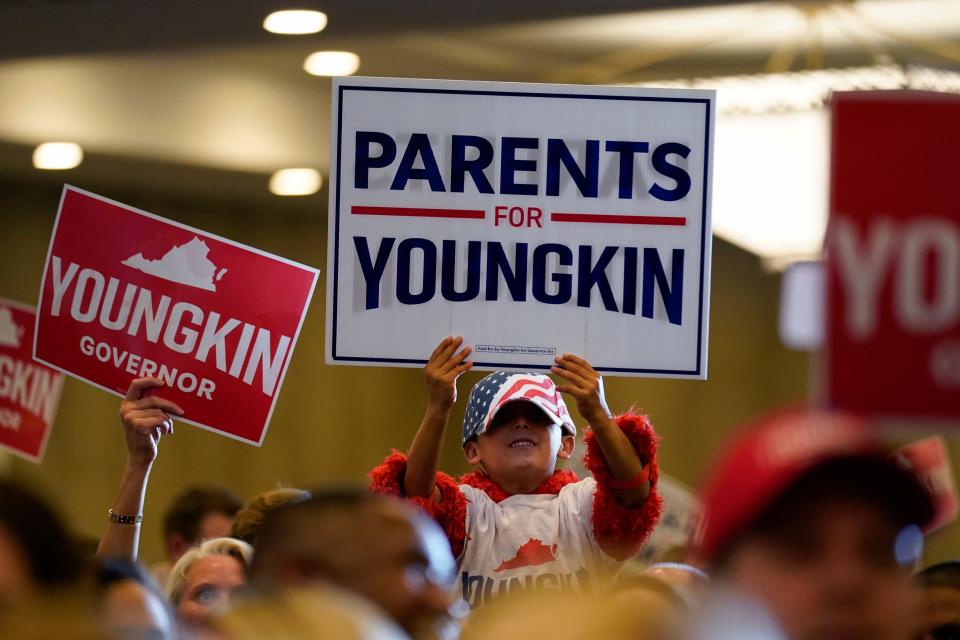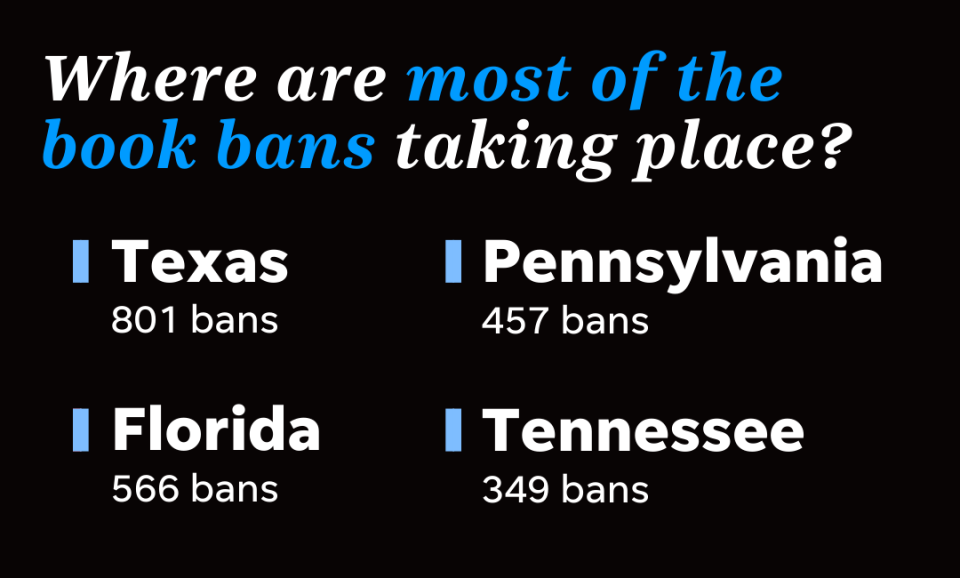White women have long been unreliable voters for Democrats. Could that change in 2024?
Jennifer Pippin had been a registered Democrat since she was 18-years-old. But a decade later, in 2014, she switched to the Republican Party.
"I felt like more of the Republican values were my values," said Pippin, a 37-year-old surgical and operating room nurse from Sebastian, Florida. "Once I actually kind of started growing up and realizing my values, I registered as a Republican," she said, saying she wanted to push for more control of her kids' education.
Pippin's departure from the Democratic Party is not unique. As the 2024 presidential election and control of Congress loom on the horizon, Democrats face an often underreported challenge: persuading white women to join — and stick with — the party, giving Democrats a shot at control of Washington.
Countdown to 2024: These candidates have already announced Senate plans for next election
"If we're going to advance progress at this critical moment in history ... we need to both turn out the base and engage more moderate white women to join a multiracial coalition for progress," said Jackie Payne, founder and executive director of Galvanize Action, an organization that mobilizes moderate white women.
Though women as a whole lean Democratic, white women tend to vote more conservatively than women of color, according to data from Rutgers University's Center for American Women and Politics.
The fall of Roe v. Wade, the landmark abortion rights case reversed by the Supreme Court in June, pulled white women to the left, helping Democrats outperform expectations in the 2022 midterm elections. But Republican messaging on education, particularly regarding COVID-19 safety restrictions and teaching of so-called "critical race theory," could make earning the demographic's votes long-term more complicated, experts say — a warning for 2024.

White women 'hiding in plain sight'
Last year’s elections saw various groups feeling ignored by Democrats, including questions about Black male voters and whether they would support Georgia Democrat Stacey Abrams’ gubernatorial run.
But perhaps less remarked upon was the fact that the vast majority of white women didn’t vote for Abrams, while most Black people did. Abrams received just 27% of white women's votes, compared to 93% of Black women's votes and 84% of Black men's votes, according to exit polls.
The same pattern happened in other states. In Ohio, 53% of white women supported Republican Senate nominee J.D. Vance, compared to 46% who supported Democratic Rep. Tim Ryan. Texas Republican Gov. Greg Abbott garnered 64% of white women's votes, while Democrat Beto O'Rourke received only 36% of their votes.
It’s not an anomaly.
Political scientist Jane Junn detailed the pattern in “Hiding in Plain Sight: White Women Vote Republican,” a blog post published after the 2016 presidential election.
In search of the perfect president: What Americans say they want, from age to gender
Since 1952, white women have only voted more Democratic than Republican twice across 17 presidential elections, she said. In 2020, former President Donald Trump won 53% of white women’s votes, according to the Pew Research Center.
Compared to white men, white women are more likely to vote for Democrats. For example, college-educated white women joined the multiracial Democratic coalition that helped the party win key races in 2020 and 2022.
However, women without a college degree were more likely to vote Republican.
“White women voters—and I don't think any of this is new— are not a cohesive voting bloc, in the same way that Black women voters are,” said Christine Slaughter, a political scientist at Boston University. “Every time we say white women voters, it has to be an asterisk. It has to be white suburban women voters, white college educated women voters, white Democratic women versus white Republican women.”
Virginia's 2021 gubernatorial election provides a good example. Republican Glenn Youngkin received 57% of all white women's votes, winning him the governor's mansion. But white women without a college degree supported Younkin at 74%, while white women with a college degree supported his opponent, Democrat Terry McAuliffe, at 61%.

The battle over public education
In recent years, Republicans' messaging on schools' purported teachings on "critical race theory" — the idea that racism is embedded in all American laws and institutions — has been particularly effective at pushing white women voters to the right, said Jatia Wrighten, an African American studies professor at Virginia Commonwealth University.
Critical race theory is an academic concept that is not taught in public schools.
Youngkin's win in Virginia was fueled in part by white, suburban moms upset about pandemic policies, which books children are required to read and what access LGBTQ youth had to bathrooms aligned with their gender.

In Florida, Gov. Ron DeSantis in June 2021 signed a bill banning the teaching of "critical race theory," suggesting the curriculum is an effort to “indoctrinate (children) with ideology.” The state recently blocked an Advanced Placement course on African American studies from being taught in Florida public schools.
“There’s this fear of this replacing of whiteness by brown and Black people, and this has been a really effective messaging for the Republican Party,” Wrighten said. “You do see a lot of white women voting more conservative in the name of protecting (their) children from these feelings of guilt."
Board shake-ups, threats to tenure: How conservatives are reshaping colleges
Pippin, the parental rights advocate, said she got involved with the conservative group Moms for Liberty to protect her children in a different way, from COVID-19 pandemic school policies like masking and social distancing.
"I didn't realize (how much influence parents could have on the local level) until 2020 when the world shut down for a virus ... that kind of opened my eyes to having to stand for parental rights more for my children who are 14 and 17 now and all children across the country."
Yet Katy O’Gara, a 46-year-old Ardmore, Pa. resident, said Republican interference in schools is turning away some white women voters like herself.
"I think a good way to reach people like me is to say things like, 'We don't need to get involved in what's happening in the four walls in your house. We trust you to raise your kids to be nice, decent people and not hurt other people. And we don't feel like we need to regulate any of that,'" O'Gara said.
Will abortion help save Democrats — again?
The 2022 overturning of Roe brought many white women back into the Democratic fold.
In the midterm elections, Democrats successfully defended every incumbent Senate seat and managed to minimize substantial losses in the House, largely due to women who were furious about the decision.
"Whether you're talking about suburban women or suburban white women, turns out we really did care about the overturn of Roe," said Katie Paris, the founder of Red Wine and Blue, a Democratic group that targets suburban women voters. "And that our memories last longer than they were thought to."
'Right side of history': VP Harris urges abortion rights supporters to continue fight on Roe anniversary
Crystal Henson, a white woman and former substitute teacher from Clyde, Ohio, said after the overturning of Roe, more women talked to her about voting for the Democratic Party.
“I think that it motivated some people to really look at the state of our country and see how the last four years of judges and things of that sort is going to have a lifelong impact,” Henson said.
In 2024, keeping control of the Senate will be an uphill climb for Democrats. They'll need to defend 23 seats, some in battleground states, whereas the GOP only needs to defend 10 seats.
But the continued fight over reproductive health care in state legislatures could help Democrats convince white women to back their candidates once again.
In Montana, lawmakers introduced SB 154, a bill that rescinds access to abortion from the state's constitution. A Wyoming Republican lawmaker introduced the Life is a Human Right Act legislation this month banning all abortions, without exception for rape or incest.
Cases to watch in 2023: Eyes on states as challenges to abortion bans move through courts
The reversal of Roe might also make Republican messaging around abortion more difficult to understand, and thus less effective, Wrighten said.
"Pro-life versus pro-choice is sort of an easy dichotomy to understand," Wrighten said. "I think it's actually now a consequence for the Republican Party, because now the party is forced to define what they actually mean by pro-life."
Can Democrats permanently bring white women voters into their base?
Brittany Koester, a white woman who started voting for Democrats during the 2018 midterms, said more voters like herself are motivated by self-interest.
"I really hate to say this, but a lot of people don't want to change unless something directly affects them," Koester said. "And that is one of the biggest problems I would say especially for white women, or white people in general, is that if it doesn't affect you, they're not necessarily going to be motivated."
Research from Galvanize Action found that persuasion programming on the economy, reproductive freedom and healthcare among white women increased their support for Democratic Senate candidates by 8.3 percentage points.
"If we do engage (white women) this way — tailored, over time, at their core values and in a way that is hopeful and solutions based and bringing them in ... then we're seeing incredible success," Payne, the head of the group, said.
The Democratic National Committee did not respond requests for comment.
Experts cautioned against going after white women voters at the expense of voters of color.
"I think we need to really give credit to Black voters for fueling Democratic victories," said Julie Kohler, a former senior advisor to the Democracy Alliance, a progressive donor network. "What I think is not a helpful debate to get into is 'do we invest in our base, or do we invest in persuasion?' It really has to be both."
But without white women, efforts to elect more Democrats into office would depend on strengthening coalitions between other marginalized groups — groups that have been "strategically" pit against each other, Wrighten said.
"Until that divide is addressed, white women are one of the more likely allies," she said. "But I wouldn't say the most reliable or consistent."
This article originally appeared on USA TODAY: Why Democrats' success in 2024 election will rely on white women vote
